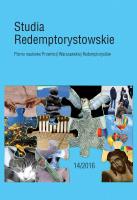Antropologia i historiozofia Aureliusza Augustyna. Kilka uwag o istocie myśli filozoficznej doktora Kościoła i jej kulturotwórczej mocy
Anthropology and historiosophy of Aurelius Augustine. A few notes on the essence of the Doctor of the Church’s philosophical thought and its cultural power
Author(s): Wiesław SetlakSubject(s): Anthropology, Metaphysics, Theology and Religion, Philosophy of Religion, Philosophy of History
Published by: Warszawska Prowincja Redemptorystów
Keywords: reason; will; God’s will; reception; illuminism; augustinism; civitas Dei; civitas terrena;
Summary/Abstract: According to St. Augustine a human being is a relationship between the soul and the body. The soul is the essence, the body is subject to the soul and the servant of the soul. St. Augustine’s anthropological dualism is based on the thesis saying that the immaterial and immortal soul rules over the body and it is a unity of three components as a representation of the Trinity. Component one is consciousness or memory (memoria), two – reason (intelligentia), three – will (voluntas). St. Augustine proclaimed that all people are divided into the redeemed and the condemned by God’s will. This division determines his historiosophy. People destined by God to salvation belong to God’s community (civitas Dei); whereas those condemned constitute the earthly society (civitas terrena), slave to Satan. The world’s history is marked by the struggle of the two communities. St. Augustine’s thought inspired many later philosophers, theologists, painters and writers, so we can speak of its powerful cultural implications.
Journal: Studia Redemptorystowskie
- Issue Year: 2017
- Issue No: 15
- Page Range: 69-80
- Page Count: 12
- Language: Polish

